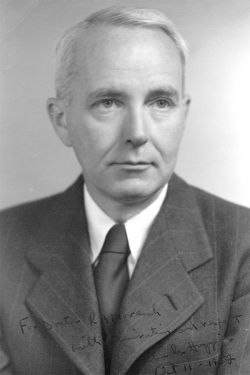Dr. Charles B. Huggins: exemplar of Acadia excellence
by Weekes, Natalie
No matter where he went, the Nobel Prize winner recalled his time at Acadia fondly

Picture it: a plaque sitting on the wall in an office at the University of Chicago that reads, “Discovery is our Business.” Of course, this is no ordinary office, and its occupant no ordinary person. This is where Acadia alumnus Dr. Charles B Huggins (’20) worked, and the plaque provided daily inspiration that characterized his research.
An internationally renowned cancer researcher, Huggins won numerous awards and distinctions throughout his career, including the 1966 Nobel Prize in Physiology or Medicine (shared with colleague Dr. Peyton Rous). He was awarded an Honorary Degree (DSC) from Acadia in 1946 and also served as Acadia’s Chancellor from 1972-79.
Huggins earned a BA from Acadia in 1920 at just 18 years of age. Completing a four-year program in three years, it was apparent that Huggins had a bright career ahead of him. Small wonder that his scientific prowess would eventually become the stuff of legend. For instance, when Huggins was appointed Chancellor, Dr. Marion Grant (’21), former classmate and then head of the Psychology department, lauded him by recalling a joke from a 1919 edition of The Athenaeum. It went: “The only two men who thoroughly understand Einstein’s theory are Einstein himself and C. B. Huggins, Acadia ’20. Joking or not,” she added, “[it was] an indication that someone had an inkling even then of the potential of this budding scientist.”
Extolled Acadia’s virtues
An undergraduate degree from a small liberal arts institution in rural Nova Scotia may seem like an odd start to an illustrious career, but the interdisciplinary foundation it provided for Huggins was critical to his success. In a sit-down interview with the CBC in July 1967, he said, “I believe that any boy who can handle his Latin verbs and Greek syntax can handle his character, and if he can handle his character he can do good cancer research.” Huggins extolled the virtues of the Acadia experience in the February 1967 edition of the Bulletin, noting, “the advantages of an Acadia education are the contacts with the many brilliant professors and fellow students. I went to Acadia for that reason. The students have contact with the professors.”
Huggins enjoyed mentoring relationships and friendships with many professors at Acadia and credits one in particular for sparking his interest in medicine. Dr. Avery DeWitt, a local physician, taught a course in human anatomy that inspired Huggins to pursue a career in medicine and later apply to Harvard Medical School. Some of his most cherished relationships were with Dr. DeWitt, Dr. D. U. Hill of the Chemistry department, and Dr. W. H. Thompson in Classics, with the relationships lasting over 30 years. Hill and DeWitt were also present when Huggins was installed as Chancellor.
Proud alumnus
No matter the number of accolades afforded him or wherever he went, Huggins remained a proud Acadia alumnus. “The lessons that I learned at Acadia have returned again and again to my mind. I have been imprinted with the excellence of Acadia,” he said.
As Chancellor, he spoke often of repaying the University for the lessons he had learned. “It is a privilege to attempt to repay Acadia in some measure for a splendid education,” he said, and that’s exactly what he did. Learning from those who had taught him, Huggins valued the relationships he formed with students during his time as Chancellor.
Bill Parker (’56), then Director of Alumni Affairs, became a close family friend and describes Huggins as a humble man and more than just a scientist. He remembers Huggins always referring to the University as ‘Acadia the beautiful’ and how he would return to Wolfville as often as possible. “He loved visiting the Farmers’ Market, walking through town and along the dykes with his wife,” Parker recalls.
The experiences Huggins had during his time at Acadia reflect those that current students encounter today. Using a cooperative educational model, students and professors engage in a learning process that is as wide-ranging as it is rigorous, with the goal of developing each person’s potential to the fullest.
This was the Acadia that Huggins encountered in his formative years and upon which he built an extraordinary life and career. Combining humanism with scientific intellect, he left an indelible mark as a researcher and a human being, and we are proud to celebrate his many accomplishments and contributions to Acadia.
By Clancy Waite (’15)
Originally published in the Bulletin, Fall 2017.
Recent Spotlights
External Relations
15 University Avenue
Wolfville, NS, B4P 2R6, Canada
General Inquiries: 902.585.1459
To make a donation: 902.585.1912
Toll Free in North America:
1.866.ACADIA (1.866.222.3428)
acadia.alumni@acadiau.ca
Charitable Registration #: 106681893 RR0001
